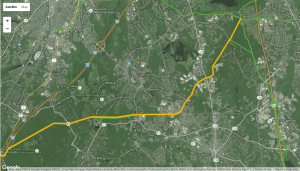New report questions costs, need for pipeline project
By Canton CitizenThe costs of the proposed Access Northeast gas pipeline expansion project would be more than double what project sponsors claim — $6.6 billion versus the projected $3.2 billion — according to a new report by Synapse Energy Economics.
The report, which project proponents contend is flawed and misleading, also projects a 27 percent reduction in the use of natural gas in New England for electric generation by 2023 (compared to 2015) and a 41 percent reduction by 2030, leaving the pipelines potentially underused and unneeded.
The report was sponsored by a coalition of environmental groups, including the Sierra Club of Massachusetts, Consumers for Sensible Energy, Pipeline Awareness Network for the Northeast, Mass Energy Consumers Alliance, Connecticut Fund for the Environment, and the Sierra Club of Connecticut.
The developers of the project, led by Spectra Energy, are seeking federal approval to construct new and improved pipeline facilities along a 125-mile route from New York state to eastern Massachusetts, ending with a five-mile stretch of new 30-inch pipeline in Canton. As part of the project, the developers would also build new compressor and metering stations as well as additional storage tanks to hold liquefied natural gas.
By expanding the region’s pipeline capacity, proponents believe it will lead to lower electricity prices and increased electric reliability on the coldest winter days, when power plant demand is greatest.
The Synapse report, however, concludes that the project would actually increase costs for Massachusetts consumers by $141 million over the life of the pipeline.
Initially, the project developers had proposed that the pipeline be paid for in part through a surcharge added to monthly electric bills, but that plan was rejected by the Massachusetts Supreme Court and the New Hampshire Public Utilities Commission.
“Our research clearly shows that Massachusetts and New England ratepayers would face substantial cost increases on their utility bills if the Access Northeast Pipeline is built,” said Pat Knight of Synapse. “Furthermore, Massachusetts ratepayers would be making an enormous investment in a pipeline that would be unneeded almost as soon as it is built, as the use of gas is displaced by mandated renewable power.”
In terms of total project costs, the report finds that the $3.2 billion figure cited by proponents is way off the mark, as it excludes other significant costs such as operations, maintenance, depreciation, and return on equity. Meanwhile, the use of gas-fired electricity will decline dramatically, according to Synapse, because electricity demand is expected to be flat for the foreseeable future and state laws require the use of more renewable resources.
“This study provides a reality check on the costs of Access Northeast to consumers and demonstrates that forging ahead with massive gas infrastructure expansion is incompatible with legal mandates throughout the region,” said Kathryn R. Eiseman, president of Pipeline Awareness Network for the Northeast, Inc. “We know that to comply with the law and sound climate policy, we must reject this gas infrastructure overbuild and double down on renewables, energy storage, and demand-side solutions — and this study shows that.”
Reached for comment, Arthur Diestel, director of stakeholder outreach for Spectra Energy, dismissed the findings of the Synapse report and said that it “fails to recognize the energy challenges facing consumers and businesses in New England.”
“The lack of adequate natural gas infrastructure is threatening our region’s energy reliability, driving up costs and hurting efforts to lower greenhouse gas emissions,” Diestel wrote in an email to the Citizen. “In fact, in December alone, New Englanders paid electricity prices that were 47 percent higher than the national average — in large part due to inadequate natural gas supplies. In addition, ISO New England — responsible for ensuring the stability of New England’s power grid — is warning that the state of our natural gas infrastructure is a ‘current, and growing, reliability risk.’ Finally, according to the Massachusetts Department of Environmental Protection, since clean-burning natural gas has begun to replace oil and coal for electric generation, we have seen 45 percent decreases in greenhouse gas emissions in the region.
“In the end, this study does a disservice to consumers by underestimating the impact on families and businesses of doing nothing and ignoring the real reliability concerns that must be addressed.”
For more information about the Access Northeast project, including an interactive map of the proposed new pipelines, go to www.accessnortheastenergy.com. To read the full report by Synapse Energy Economics, go to synapse-energy.com/sites/default/files/new-englands-shrinking-need-for-natural-gas-16-109.pdf.
Short URL: https://www.thecantoncitizen.com/?p=35641











